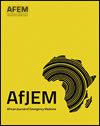Knowledge, attitude, practice, and associated factors of physicians towards cardiopulmonary resuscitation at a tertiary hospital in Ethiopia
IF 1.2
4区 医学
Q3 EMERGENCY MEDICINE
引用次数: 0
Abstract
Introduction
Cardiopulmonary resuscitation (CPR) is performed on victims of cardiac arrest. It is important for health professionals to successfully perform these lifesaving skills. This study aimed to assess the CPR knowledge, attitude, practice, and associated factors of physicians working at Hiwot Fana Comprehensive Specialized Hospital Eastern Ethiopia.
Methods
An institutional-based cross-sectional study was implemented. A stratified random sampling technique was used. A self-administered questionnaire and a manikin was used to assess CPR skills. The results are presented in the text, tables, and graphs. Multivariate logistic regression was used to identify factors associated with levels of competency. The adjusted odds ratio with the corresponding 95 % confidence interval was calculated to show the strength of the association.
Results
This study revealed that 63.7 % [95 % CI 57 % -71 %] of the physicians had good knowledge, and their overall competency in CPR was found to be 63 % [95 % CI 54 % - 72 %]. They have a positive attitude regarding the importance of CPR and a willingness to provide CPR. Physicians who took resuscitation training (adjusted odds ratio 11.8 [4.29–32.42]) and a specialist (adjusted odds ratio 7.99 [1.87–34.27]) were more competent than their counterparts.
Discussion
The results demonstrate suboptimal CPR competency among physicians’ representatives at a tertiary hospital in Eastern Ethiopia. Taking CPR training and being a specialist were found to have an effect on being competent in CPR. Participants reported positive attitudes toward doing CPR. A system of regular, updated refresher training for physicians should be implemented to maintain CPR competencies. Hospitals should also be equipped with materials and drugs needed for CPR.
埃塞俄比亚一家三级医院医生对心肺复苏的知识、态度、实践及相关因素
心肺复苏(CPR)是对心脏骤停的受害者进行的。对卫生专业人员来说,成功地运用这些救生技能是很重要的。本研究旨在评估埃塞俄比亚东部Hiwot Fana综合专科医院医生的心肺复苏术知识、态度、实践及相关因素。方法采用基于机构的横断面研究。采用分层随机抽样技术。一份自我管理的问卷和一个人体模型被用来评估心肺复苏术的技能。结果以文本、表格和图表的形式呈现。使用多元逻辑回归来确定与能力水平相关的因素。计算校正后的比值比和相应的95%置信区间,以显示这种关联的强度。结果63.7% (95% CI 57% ~ 71%)的内科医生具备良好的心肺复苏术知识,63% (95% CI 54% ~ 72%)的内科医生具备心肺复苏术的综合能力。他们对心肺复苏术的重要性有积极的态度,并愿意提供心肺复苏术。接受过复苏培训的内科医生(调整优势比为11.8[4.29-32.42])和专科医生(调整优势比为7.99[1.87-34.27])比同行更有能力。讨论结果表明,在埃塞俄比亚东部三级医院的医生代表的心肺复苏术能力次优。研究发现,接受心肺复苏术培训和成为专家对胜任心肺复苏术有影响。参与者报告了对心肺复苏术的积极态度。应该对医生进行定期更新的进修培训,以保持心肺复苏术的能力。医院也应该配备心肺复苏术所需的材料和药物。
本文章由计算机程序翻译,如有差异,请以英文原文为准。
求助全文
约1分钟内获得全文
求助全文
来源期刊

African Journal of Emergency Medicine
EMERGENCY MEDICINE-
CiteScore
2.40
自引率
7.70%
发文量
78
审稿时长
85 days
 求助内容:
求助内容: 应助结果提醒方式:
应助结果提醒方式:


